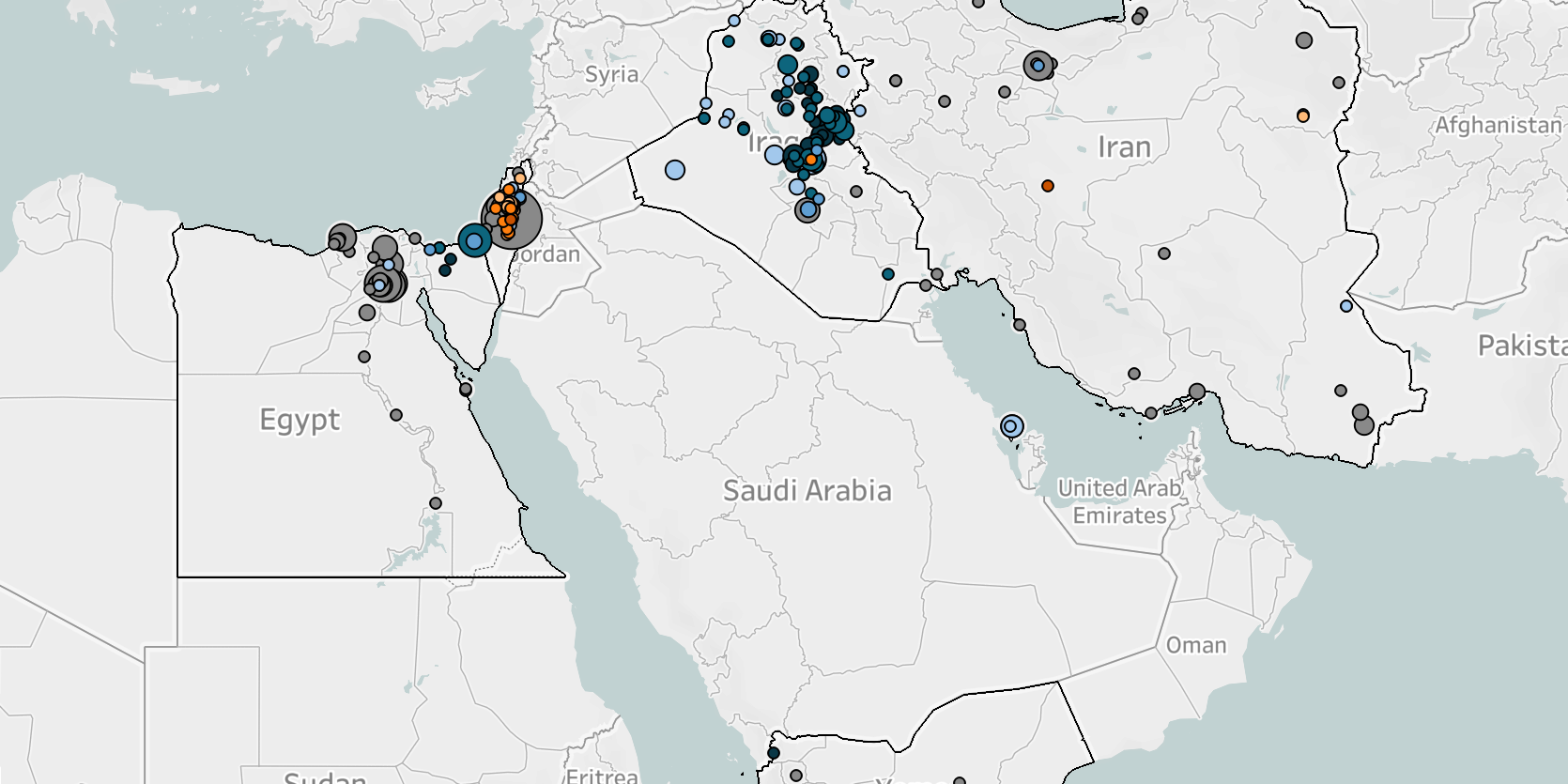Last week, violations against religious minorities were reported in Iran, with a total of 25 Baha’is arrested during the month of April. In Yemen, the suppression of the largely Sunni practice of Tarawih — a prayer held specifically during Ramadan — by pro-Houthi forces continued for the second week of the holy month of Ramadan. In Egypt, the government executed nine individuals accused of a raid on a police station in 2013, which left 14 police officers dead. Several human rights organizations have denounced the executions and cast doubt on the accusations. In Israel, a stampede at the Lag B’Omer Jewish holiday site at Mount Meron resulted in many casualties. In Palestine, Israeli authorities initially lifted the barricades erected around Damascus gate in Al Aqsa mosque, but five days later reinstated them, for reasons left unspecified. They also prevented Palestinians from the West Bank from performing prayers at the mosque, citing coronavirus restrictions.
In Iran, the campaign targeting Baha’i citizens has not slowed down, with Bahai’s arrested every week of April. Last week, Iranian security forces conducted raids of the residences of at least 19 Baha’i households in the city of Baharestan and arrested at least 10 Baha’i citizens (Human Rights Activists News Agency, 25 April 2021). Two Baha’i citizens were also arrested in Shiraz, bringing the total to at least 25 Baha’is arrested or detained in April (Iran Press Watch, 1 May 2021).
However, Baha’is were not the only minority group targeted in Iran last week. Iranian authorities disqualified all Sunni Muslim candidates from the upcoming Islamic Local Council elections in the city of Kermanshah, scheduled to take place on 18 June, for unspecified reasons. Sunni Muslims have been allowed to run in all previous elections, and Sunni representatives have been elected in the last five councils (Sunni News, 28 April 2021).
In Yemen, pro-Houthi authorities continued their targeting of Tarawih prayers in Sanaa. At least one Imam was dismissed, and two mosques were stormed to prevent mostly Sunni worshippers from praying Tarawih (Al Mashhad Al Yemeni, 29 April 2021). At the same time, pro-Houthi Zainabiyat (women’s unit) forces continued the shutting down of several women’s prayer halls in Sanaa (Al Mashhad Al Yemeni, 23 April 2021). Supreme Political Council member and Houthi leader Muhammad Ali al-Houthi denied the allegations that Houthi authorities were interfering with the practice of Tarawih prayers, but called the practice “heresy” (Twitter, 1 May 2021).
Last week in Egypt, the state executed at least nine individuals, including an 82-year-old Sheikh, after the courts found them guilty of taking part in the 14 August 2013 raid on the Kerdasa police station, which resulted in the deaths of several police officers. The raid was carried out by supporters of overthrown President Mohammad Morsi, who is affiliated with the Muslim Brotherhood. The raid had been in response to Egyptian security forces killing hundreds of Morsi supporters while dispersing a sit-in at the Raba’a square earlier that day. Nine Egyptian human rights organizations, as well as Amnesty International, reject the accusations made against the nine individuals. They also denounce the executions, citing repeat violations of due process during the trials, and alleged coerced confessions (Amnesty International, 26 April 2021).
In further developments in the Egyptian legal system, a legal precedent was set by an Egyptian criminal court. The court rules that voice messages on WhatsApp and Facebook Messenger are sufficient evidence to prove cases of zina — the Islamic legal term for adultery (Youm7, 29 April 2021). This ruling departs from the current legal practice, as judges were previously bound by Egyptian and Islamic law. These laws — in accordance with the traditional opinions of several schools of Islamic law — stipulated that a conviction for zina requires that someone directly witness the act, that a party confessed to it, or that written documents attest that it took place.
In Israel, a stampede at celebrations of the Lag B’Omer Jewish holiday at Mount Meron left 45 people dead and at least 150 more injured (The Times of Israel, 30 April 2021). Approximately 90,000 mostly Haredi Jews — well over the government sanctioned 10,000– packed onto Mount Meron to celebrate the holiday this year, following its cancellation last year due to the coronavirus (JPost, 1 May 2021). Attempts by Israeli police to set up fences and to close the entrance to the Tomb of Rabbi Shimon Bar Yochai, which is an integral part of the celebrations, are believed to have led to the incident. This is the largest public gathering since Israel started lifting coronavirus restrictions on 7 April.
In Palestine, following a week of confrontations, Israeli police on 25 April removed the barricades placed at Damascus gate in Al Aqsa in East Jerusalem, in a move aimed at easing tensions (Al Jazeera, 26 April 2021). However, by 30 April, the barricades were reset, for unspecified reasons, and restrictions were put in place targeting Palestinians from the West Bank entering East Jerusalem to take part in Friday prayers at Al Aqsa mosque. Israeli forces set up checkpoints on streets leading to Al Aqsa, and only allowed Palestinians vaccinated against coronavirus to pass (Middle East Monitor, 24 April 2021). Some of those prevented from praying protested by holding their own prayers at Israeli-run checkpoints in the West Bank (Al Monitor, 17 April 2021). This is taking place at a time when the Palestinian Ministry of Health has been reporting a vaccine shortage in the West Bank (Al Monitor, 10 March 2021). For the second week in a row, East Jerusalem continues to be a flashpoint for confrontation between Palestinians and Israeli authorities during the holy month of Ramadan.
All ACLED-Religion pilot data are available for download through the ACLED-Religion export tool. Explore the latest data with the interactive ACLED-Religion dashboard.






